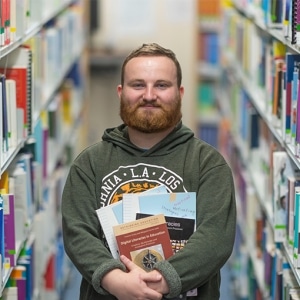When you’re starting your research career as an academic researcher, there will be many things that overwhelm you when you start out. As someone who has been through this myself, I have put together 5 ways of dealing with overwhelming feelings during your PhD journey.
These strategies may not work every time, but they’ve helped me get through my own struggles so far and hopefully can help you too!
1. Know What’s Going On
Before you dive into trying to solve any problem or figure anything out, take care of yourself mentally by knowing what exactly overwhelms you at the moment. One way to do this is to journal about what stresses you right now. When you feel more able to cope, try exploring solutions for those issues.
For example, if you find yourself struggling with managing workload, then it might be helpful to know that this type of stress often occurs at the very beginning and very end of a PhD, at least for myself and others I’ve spoken to.
Knowing the sources of your stress is the first step to addressing it.
2. Take Care of Yourself
Once you understand why you’re feeling overwhelmed, the next thing to consider is taking care of yourself physically. Stress from work, school, relationships etc., all contribute to poor health decisions such as skipping meals, engaging in unhealthy eating habits, drinking or smoking excessively, reducing sleep and exercise etc. All of which impact negatively on our physical and mental well-being.
In addition, one study showed that people under extreme levels of pressure (such as doctoral candidates) were more prone to developing heart problems compared to other groups. So while taking care of yourself should always be a priority, it’s especially important to prioritise it even further when we’re stressed.
It can seem difficult to balance personal needs and researcher responsibilities, but doing so requires prioritising self-care over everything else. In order to achieve this, set aside dedicated blocks of time each day where you avoid distractions, focus solely on activities related to your wellbeing, and allow yourself to fully engage in whatever activity brings peace to your mind and body.
3. Talk About It With Friends and Family
One thing that you learn early in a PhD is that there’s no such thing as a free lunch. While the rewards of doing your PhD are many, there is a significant cost, and it comes in the form of stress.
You’ve probably heard the expression “PhD students are walking time bombs” – which is basically just a polite way of saying that PhD students are walking around with a serious short-fuse, and it’s only a matter of time before that fuse goes off.
Seek support from others before that happens…
Talking to close friends and family members helps us to process emotions better. Research shows that talking to others provides relief by releasing negative thoughts and worries, so we don’t need to carry them around inside ourselves throughout the rest of the day. Having supportive individuals in our lives makes it easier to handle both small tasks and large ones.
If you live alone, however, having someone available to discuss your concerns with can provide valuable insight into whether or not you’re handling stressful events properly. A friend or family member can offer perspective and guidance without judging you for your current situation.
4. Make Time For Fun Activities
We’ve all heard that it takes 10 years to make a really brilliant scientist. You might have trouble proving this, but it is a very long time, and many people struggle with sticking to a research plan that is longer than 3 months.
We also know that there are many distractions available in the ‘real world’, that are not available to researchers. A few months ago, for example, I went to a pub quiz night. While this may sound like a total waste of time, in fact it has become a huge amount of fun for me, and has helped me to get my research into the right place.
I also find that regular, non-research-related social events help keep things fresh and remind me that there are more important things than my research at the moment.
5. Accept That This Is Just Part Of The Process
The hardest part about completing a PhD program is simply surviving it. Many of the lessons learned along the way will come from overcoming obstacles and failures. Learning from setbacks and mistakes prepares us for future success. But sometimes, no matter how hard we try, we just won’t be successful at accomplishing certain milestones or reaching our desired outcome.
That doesn’t mean giving up though. Instead, accept that failure can happen and move onto bigger opportunities. Sometimes we learn more from our successes and achievements rather than focusing on our failures and shortcomings. Also, remember that setbacks aren’t permanent. Often, after a short period of mourning, we bounce back stronger than ever.
We shouldn’t beat ourselves up over failing. Rather, let it inspire us to become wiser and smarter for next time. After all, it takes countless attempts to master the skills required to succeed.
Conclusion
Regardless of how you’re feeling, remember that you are not alone. You are not alone on your PhD journey. You are not alone in your feelings. And you are not alone in your desire to succeed.











